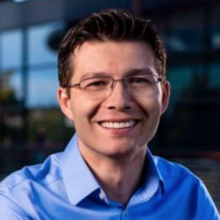Sergiu Pasca, MD is Faculty in the Department of Psychiatry and Behavioral Sciences at Stanford University and the Uytengsu Director of the Stanford Brain Organogenesis Program. He is also a CZI Ben Barres Investigator and a NYSCF Robertson Investigator. Pasca was born in Cluj-Napoca, Romania, where he trained as physician before moving to the US to pursue basic research, joining the Stanford faculty in 2014. His laboratory explores the biological underpinnings of brain disease using cellular models of the human brain created using reprogramming technology. Dr Pasca developed some of the initial in-a-dish models of disease by deriving neurons from skin cells taken from patients with autism and other neurodevelopmental disorders. These patient-derived neurons helped uncover the cellular effects of specific mutations and demonstrated the promise of this novel platform. Dr Pasca pioneered technology that allows to take stem cells from patients and engineer lab-grown self-organizing three-dimensional structures called brain organ spheroids or organoids. This 3D brain tissue resembles specific regions of the nervous system and can be put together into preparations now called brain assembloids to form neural circuits and to gain access to previously inaccessible aspects of human brain function. Dr Pasca is a well-regarded teacher and he was named a Visionary in Medicine and Science by the New York Times. He is the recipient of the Vilcek Award for Creative Biomedical Promise (shared with CRISPR engineer Feng Zhang and neuroengineer Polina Anikeva), the A.E. Bennett Award in Biological Psychiatry, the MQ Fellow Award for Transforming Mental Health, the NIMH Director’s BRAINS Award, the Folch-Pi Neurochemistry Award, the ASCB Early Career Award for Cell Biology and the Daniel E. Efron Award.
Sergiu Pasca
-
 Sergiu Pasca
Sergiu Pasca